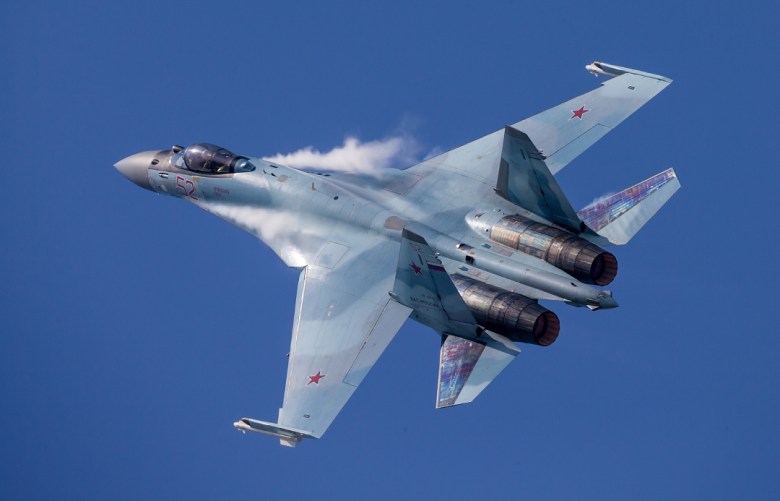Politics
Russia Agrees to Supply Iran with Su-35 Fighter Jets for $6.5 Billion

Russia has reportedly finalized a significant arms deal to supply Iran with 48 Su-35 multirole fighter jets, potentially reshaping the airpower dynamics in the Middle East. According to leaked documents from Russia’s state defense conglomerate, Rostec, and its subsidiary Concern Radio-Electronic Technologies (KRET), this deal is valued at approximately $6.5 billion and is set to be executed between 2026 and 2028. The documentation, allegedly obtained by Ukrainian hackers, includes over 300 files detailing this substantial transaction, with a customer code identified as “364” linked to Iran.
The Su-35 jets will be equipped with advanced technology such as Khibiny-M electronic-warfare pods and Irbis-E radar systems. Assembly of these aircraft may take place at Iran’s Shahid Babayi Air Base near Isfahan, under local supervision. This deal marks a critical shift in military capabilities for Iran, especially in light of recent US and Israeli strikes on its nuclear facilities.
The negotiations for this deal seem to stem from barter arrangements involving Iranian drones and oil, initiated in 2022. In January 2025, a commander from the Iranian Revolutionary Guard Corps (IRGC) confirmed that the Su-35 contract had been finalized. This announcement coincides with Russia’s previous delivery of MiG-29 jets to Iran, which provided a temporary boost to Tehran’s airpower while awaiting the arrival of the more sophisticated Su-35s.
Potential Impacts on Iran’s Air Force
The introduction of these fighter jets could significantly modernize Iran’s aging air force, which still relies heavily on pre-1979 Revolution aircraft like the F-14 and F-4. The Su-35s would enable Iran to establish two modern squadrons and initiate its first quasi-domestic fighter assembly line. However, the question remains: will this deal genuinely enhance Iran’s military capabilities or merely highlight the limitations of Russia’s military commitments?
Iran’s air defenses have recently been criticized for their ineffectiveness against combined US and Israeli airstrikes. In June 2025, Paul Iddon reported in Forbes that Iran’s air force struggled during Israeli attacks, managing to scramble only a single MiG-29 against incoming Israeli F-16s. The situation worsened with the loss of two Iranian F-14s on the ground during these strikes, showcasing the inadequacies of Iran’s current air defense systems.
US strikes have also severely impacted Iran’s nuclear capabilities, effectively destroying much of its centrifuge enrichment capability, according to a report from the Institute for Science and International Security. Experts are skeptical about Iran’s ability to rebuild its nuclear program without assistance from allies such as China or Russia.
Technological Advantages of the Su-35
Despite these challenges, military analysts have noted that the Su-35 could surpass Israel’s older F-15 and F-16 aircraft, which have not received upgrades to a 4+ generation standard. In an article for Defense Security Asia, Ukrainian Air Force spokesperson Yuriy Ihnat emphasized that the Su-35 is superior to the older F-16 models currently in service with Ukraine. The Su-35’s heavy armament, capable of carrying 12 air-to-air missiles and its exceptional maneuverability, gives it a significant edge in one-on-one combat scenarios.
Moreover, the Su-35 features three complementary radars, including the primary electro-mechanical Irbis-E radar and wing-mounted N036B-1-01 active electronically scanned array (AESA) radars. This advanced technology enhances its ability to detect stealth aircraft and bolster ground defenses. Analysts suggest that if Iran equips its Su-35s with the long-range R-37M air-to-air missile, it could pose a considerable threat to Israeli tanker aircraft, vital for supporting Israeli operations.
While the Su-35 presents various tactical advantages, it is not without vulnerabilities. The ongoing conflict in Ukraine has highlighted the aircraft’s limitations, with reports indicating that Russia has sustained significant losses, including eight confirmed losses and up to 25 claimed by Ukrainian sources. These losses have been attributed to various factors, including Ukrainian air defenses and possible encounters with F-16s.
The sustainability of such an arms deal also raises questions. According to a report from the Institute for the Study of War, production capabilities at Russia’s United Aircraft Corporation (UAC) are facing significant challenges. While plans are in place to increase production by 30% by 2030, current output remains limited, with only one aircraft potentially produced every one to two months.
Additionally, Russia’s military cooperation with Iran appears to be strategic and selective. Hamidreza Azizi noted in an article for the Middle East Council for Global Affairs that Russia is cautious about deepening its military entanglements with Iran, particularly concerning regional conflicts with Israel. This careful balancing act indicates that Russia may prioritize maintaining its relations with other regional players, such as the Gulf Cooperation Council (GCC).
In conclusion, while the anticipated delivery of Su-35s could provide Iran with a powerful new capability, the overall impact on Iran’s air force and regional power dynamics will largely depend on Russia’s commitment to fulfilling this deal amidst various operational and geopolitical constraints.
-

 Lifestyle4 months ago
Lifestyle4 months agoHumanism Camp Engages 250 Youths in Summer Fest 2025
-

 Business5 months ago
Business5 months agoKenvue Dismisses CEO Thibaut Mongon as Strategic Review Advances
-

 Sports4 months ago
Sports4 months agoDe Minaur Triumphs at Washington Open After Thrilling Comeback
-

 Sports5 months ago
Sports5 months agoTupou and Daugunu Join First Nations Squad for Lions Clash
-

 Top Stories5 months ago
Top Stories5 months agoColombian Senator Miguel Uribe Shows Signs of Recovery After Attack
-

 World5 months ago
World5 months agoASEAN Gears Up for Historic Joint Meeting of Foreign and Economic Ministers
-

 Health4 months ago
Health4 months agoNew Study Challenges Assumptions About Aging and Inflammation
-

 Business5 months ago
Business5 months agoOil Prices Surge Following New EU Sanctions on Russia
-

 Entertainment4 months ago
Entertainment4 months agoDetaşe-Sabah Violin Ensemble Captivates at Gabala Music Festival
-

 Entertainment4 months ago
Entertainment4 months agoBaku Metro Extends Hours for Justin Timberlake Concert
-

 Top Stories5 months ago
Top Stories5 months agoRethinking Singapore’s F&B Regulations Amid Business Closures
-

 Business5 months ago
Business5 months agoU.S. House Approves Stablecoin Bill, Sends to Trump for Signature









